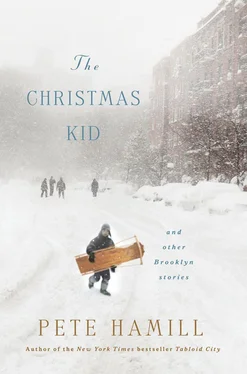He grabbed for the handle, twisted it, yanked at it, then pounded against its painted metal skin. But the door was firmly, solidly locked. For the moment, at least, he was trapped in the black terrain of the roof. He cursed now, blunt obscenities retrieved from his youth, the words like impotent weapons hurled at the wind and the darkness and his own dread. And then, far across the rooftop, he saw something move.
A man. In a T-shirt on this cold night. There were tattoos on his arms, and a bandanna around his brow, his skin a sickly white. “Who are you?” Ira asked hoarsely, across the distance. But there was no answer. Then he saw another figure, smaller, with Hispanic features, and then another, a heavy-bellied white man, and then a muscular black man, all of them emerging from the darkness.
He tried to speak, but the words wouldn’t come, and he backed away, backed away, seeking light and escape, and still they came, more of them now, possessors of the roof and the Factory. He thought he heard the word “strike” once, then again, whispering at him in the darkness, “strike,” and then, at the lip of the roof, one final time, “strike,” before he plunged into the light.
THERE WAS A DOUBLE-PARKED panel truck on 52nd Street near Ninth Avenue, and a sanitation truck trying to squeeze by, and a line of backed-up cars from Jersey, their drivers leaning on the horns in the cold, anxious morning. Then one of the sanitation men came around from the front to see whether the squeeze was possible. He was very calm. He gave soothing signals to the people in the cars and then estimated the room the truck needed to pass through. I knew him. Sonny Rosselli.
“Hey, Sonny!”
He turned and I waved and he came to my car and peered at my face, as if trying to remember. I told him who I was and got out of the car. He embraced me and then the Jersey drivers were crazed again, and I told Sonny I’d pull around the corner after he got the truck through the morning slalom.
Sonny Rosselli. Thirty years ago, he’d been Sonny Rosselli the poet.
“Hey, listen, I’d love to talk to ya,” he said. “But I can’t leave the truck. I’m off at half past eleven. Can I meet ya someplace?”
“The coffee shop next to the Music Hall,” I said. “Eleven thirty.”
All morning I thought about Sonny Rosselli. I had met him in the seventh grade, when he moved to our Brooklyn neighborhood from the Bronx. He was a good stickball player, a strong, curly-haired son of Sicilian immigrants, with a beautiful sister and two older brothers. He was lousy in math, but he could write like an angel.
“I love the way these words sound,” he’d say. “ Shore, I mean. ‘Shore’ sounds like a shore, know what I mean? Like the ocean’s comin’ right up there and making that sound. Shooore.” He liked “meadow,” too, and “dusk,” and “dark.” And soon he began to string these words together and make poetry. I don’t remember any of the poems, and perhaps they weren’t any good; I remember that Sonny’s major ambition was to have a poem published in Nick Kenny’s column in the Daily Mirror .
“Look at this, ” he’d say, showing me Nick Kenny. “Listen to what these guys do wit’ words .”
We had a nice Xaverian brother named Rembert in the seventh grade, and he must have realized that Sonny Rosselli was special; he gave Sonny a rhyming dictionary and thesaurus, and gave him passing grades in math as long as Sonny kept making poems. He explained to Sonny that there were people called poets; that was their job; they wrote poems. And Sonny started saying that maybe when he grew up he could be a poet.
“Imagine,” he’d say. “You write poems all day and they pay you for it!”
That spring, the miracle happened. Sonny Rosselli sent a poem to Nick Kenny and Nick Kenny published it. It was about love, of course. And Brother Rembert had to fight back tears as he held up the Mirror for all of us to see and then read us that poem. We were all rough kids from the wrong side of Brooklyn, but one of us, at least, had made it. Sonny Rosselli was a celebrity. A poet. An honest-to-God published poet.
His great moment didn’t last. The other boys teased him brutally, making swishing gestures at him, talking with pursed lips as they read off the verses. Sonny was confused; why wouldn’t they want to hear something beautiful? He fought three separate schoolyard fights on one afternoon, hurting his hands. He won all three, but he left the last one in tears.
“They’re so dumb, ” he said later. “They’re so stupid, know what I mean?”
He didn’t show his poems to everybody now; he took them to Brother Rembert, and a few of the other kids; but he didn’t get up to recite in class. He didn’t talk about becoming a poet, either. In that neighborhood in those days, you could say you wanted to be a cop or an ironworker, a fireman or dock worker; you never said you wanted to be a poet. Then one Friday, Nick Kenny published another poem. Sonny Rosselli was embarrassed. Even afraid.
“I hope my father don’t see the paper,” he said. “Or my brothers.”
That Monday, he didn’t come to school. I went around to his house in the afternoon and his mother said he wasn’t feeling well. I looked past her and saw Sonny. His face was swollen, and there was a bandage over his left brow. I didn’t find out for three more days that when he came home that Friday night, his father had beaten the poetry out of him forever.
“He says poetry’s for fags,” Sonny explained later. “Maybe he’s right.”
We went to different high schools, and then I went into the navy and he joined the army and we lost track of each other. And now, on this late morning years later, we were sitting in a booth in a midtown coffee shop, eating scrambled eggs. He told me about his life: a nice wife, three grown-up kids, a house in Queens Village that was almost paid off. His brother Frankie lived in California. His sister married a cop and was a grandmother already. His parents were still alive, living in Bensonhurst.
“Do you ever write poetry any more?” I asked.
“Nah.”
“You sorry you didn’t follow it up?” I asked.
“Sometimes.”
He looked out past the booths to the street. Traffic was jammed. Three Rockettes from the Music Hall hurried in and took a booth together.
“Maybe I was born ten years later, it would’ve been different,” Sonny said. “Maybe I could’ve gotten into rock and roll. I know I could write as good as them guys.” He laughed. “But who knows? It’s a long time ago now. And, hey, it’s not the most important thing in the world. I’m alive, right? My brother Charlie got killed in Korea. I’m still here.”
The Rockettes finished their coffees and left. Sonny ordered another cup. The waitress took our plates away.
“The truth?” he said quickly. “I never forgave my father. I tried. I used to say to myself he don’t know any better. He’s from the old country, all he knows is work . Work is what you do wit’ your back, your hands . Everything else is stealin’. He meant right. But if he ever said to me, ‘Sonny, this is beautiful, this poem,’ I would’ve lived another life.
“I mean, I don’t mind my life. I love my family. I do honest work. But if he’d’ve been wit’ me, maybe I could’ve taken the rest of it. The crap from the neighborhood, I mean. I was a kid. I didn’t want to be different. I used to think, jeez, I got this thing, like a gift . And how come God give me this thing? But maybe I didn’t deserve it. Maybe that was why I gave it up so easy. Get what I mean?”
Читать дальше












